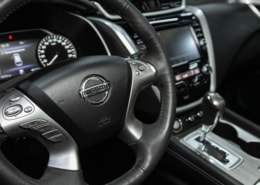The Ultimate Guide to Buying an Auto Warranty in 2024
Everything You Need To Know About Extended Car Warranties
My extended auto warranty guide will teach you everything you ever wanted to know on how to find, research, select and purchase a new or used car extended auto warranty.
Also known as vehicle service contracts, when offered by a third party, these contracts can vary significantly in price, coverage, or both.
Table of Contents
- Auto warranties can be confusing
- What is an extended auto warranty?
- Types of available coverage
- How much does an auto warranty cost?
- Benefits of buying an extended auto warranty
- What to look for in a good auto warranty
- When you should avoid a warranty company
- Additional extended auto warranty tips
- Extended auto warranty FAQs
Auto Warranties Can Be Confusing
Navigating the confusing sea of details about different plan options and coverage tiers when buying an extended auto warranty can be difficult.
I break down all the information you need to know in this extended auto warranty guide, from typical costs to coverage options, to help you determine whether an extended warranty is worthwhile and suitable for you.
I’ll also offer some of the top choices online that I recommend for free extended auto warranty quotes so you can compare shop prices and coverage.
What is an Extended Auto Warranty?
By law, the maker of the product (vehicle) is the only one that can provide you with warranty coverage and refer to it as such.
When a third-party service provider provides coverage, it is considered an after-market product. These policies go by different names, such as vehicle service contracts, extended service agreements, or mechanical breakdown agreements.
An extended warranty is a contract stating the warranty provider will repair or remedy any defects or damage when something breaks on the vehicle within a certain period or mileage. The seller will fix the car, and there will be no cost to the buyer unless otherwise stated in the contract agreement (deductible may or may not be required).
NOTE: Often, the dealer owns the company providing the extended warranty policies they sell. Car dealers make a ton of money selling extended warranties; it’s all a numbers game. Dealers sell way more policies than claims being made. This, in turn, makes for a profitable product.
There are coverage plans available for new and used cars alike. Keep in mind; If you buy a warranty for a new vehicle, it will run concurrently with the manufacturer’s factory warranty. If you have a covered repair, the manufacturer’s warranty will take precedence until it has expired.
Types of Available Auto Warranty Coverage
I’ve witnessed customers buy extended service contracts by only listening to the salesperson or finance manager’s pitch.
Many times salespeople will unknowingly (or knowingly) mislead customers by making statements such as “bumper-to-bumper coverage” and “if it breaks, don’t worry, it will be covered” when it’s simply not true.
There are three main categories of warranty coverage you’ll encounter when looking for a vehicle protection plan:
Main auto warranty categories:
- Bumper-to-bumper – Of the three main categories of extended auto warranties, bumper-to-bumper warranties typically offer the most thorough coverage. Exclusionary contracts, except those listed explicitly as not being covered, cover repairs for most major systems and components.
- Named component – A named component warranties specifically list each component of your car that is covered and inclusive.
- Powertrain – A powertrain warranty covers your vehicle’s engine and drivetrain. The drivetrain, to put it simply, is what propels your car’s wheels.
All auto warranties are not created equal, each provider has tiered levels of protection, and they all go by different names. Below are some examples of tiered coverage.
Examples of tiered levels of coverage:
- Power train Coverage (lowest level and least expensive)
- Standard Coverage
- Comprehensive Coverage
- Ultra Wrap Coverage (highest level and most expensive)
Don’t ever take a salesperson’s word for what is covered in a vehicle service contract. Unethical salespeople may say whatever it takes to make a sale.
Each warranty provider has their explanation of “bumper-to-bumper,” my advice is to do the research yourself and ask each company what their definition of the term is.
Recommended warranty coverage:
- Mechanical Breakdown Coverage
- Wear and Tear Coverage
- Exclusionary Coverage
I recommend you purchase coverage that includes both “mechanical breakdown coverage” and “wear and tear” coverage.
This type of protection will provide you with the most significant level of security and cover large, expensive items like engines and transmissions and lesser, more common parts and systems.
You also want exclusionary coverage instead of an inclusionary policy. Exclusionary policies cover everything on the vehicle unless it is listed on their exclusionary list. An inclusionary warranty only covers what is specifically listed on the contract.
How Much Does an Auto Warranty Cost?
My research and experience indicate that an extended auto warranty typically costs between $1,495 and $3,895, or about $2,695 on average.
To determine if a protection plan is worthwhile depends mainly on the extended warranty cost.
The cost of extended warranty coverage depends on several variables, including:
- The make, model, mileage, and age of the vehicle
- Deductible
- Level of coverage
- Term length
It’s important to consider potential repair costs when weighing the cost of an extended warranty to see if it’s worthwhile. Hopefully, you will never have to make use of auto warranty coverage.
However, here are a few potential repair costs for major repairs:
- Alternator replacement – $725
- Water pump – $930
- A/C compressor – $1,095
- Fuel pump replacement – 1,195
- ECM / PCM compressor – $1,395
- Transmission – $4,600
Being ready to pay hundreds or even thousands of dollars out of pocket to fix any problems your car has can be challenging. For many car owners, the peace of mind that an extended warranty can provide from knowing that these expensive repairs are covered in the event of a mechanical breakdown or breakdowns is worth it.
If an unanticipated repair need occurs, the price of an extended auto warranty can be highly beneficial.
Benefits of Buying an Extended Auto Warranty
Investing in an aftermarket vehicle service contract can give you peace of mind while operating your car and may end up costing you much less in the long run.
Suppose you don’t have an extended car warranty. In that case, you will be responsible for paying for any costly repairs your car might require after the factory warranty on your new vehicle expires.
I believe protecting your vehicle is an excellent financial decision. However, I don’t think you should overbuy coverage or pay too much for an extended auto warranty.
What to Look for in a Good Extended Warranty
Listed below are certain things you should do and look for in good auto warranty coverage:
- Always ask what is NOT covered and review it well.
- When does the mileage limitation start, mile zero, or the mileage currently on the vehicle?
- How much is the deductible? (higher the deductible, the cheaper the warranty)
- Is the deductible “per visit” or “per repair item?”
- How many months and miles will your vehicle be protected?
- Can you choose any repair shop or dealership to have repairs done?
- Is the company certified by the Better Business Bureau?
- Does the company pay for repairs upfront with a corporate credit card?
- Is the policy transferable to another person or vehicle?
- Call their customer service line. How fast do they pick up, and are they rude?
- Is the warranty provider insured and re-insured by a significant company?
- Will the company pay claims for the life of the contract?
When You Should Avoid an Auto Warranty Company
You may want to avoid a warranty company if they have or do any of the following:
- Customer complaints and satisfaction are not strong with the Better Business Bureau
- The policy is not transferable
- You pay for repairs upfront and out of pocket
- Cold calls to your home. (reputable companies don’t operate this way)
- Meager prices, scare tactics, or bad-mouthing the competition.
- Limits on spending and repair costs
- An extensive exclusions list of what the plan will not cover
- Lifetime or unlimited mileage contracts
- You’re solicited through the mail claiming your warranty is expired
Additional Extended Auto Warranty Tips
The golden rule to buying an auto warranty is to research what’s covered and not covered by the policy. You will find this information on the warranty contract, typically found somewhere on the back in the fine print.
- Don’t overbuy coverage for your vehicle.
- Never take a salesperson’s word on what a plan covers.
- You don’t have to buy a warranty from a car dealership.
- Make sure you read the actual contract before signing anything.
- Don’t include (roll) the warranty cost into your car loan.
- Leave room in your budget for an extended service contract.
- Get competitive quotes before contacting a car dealership.
- The cheapest warranty is not always the best coverage for you.
- You don’t have to buy a policy at the same time you buy a car?
Use Trusted Online Auto Warranty Companies
Instead of paying too much at a dealer, I recommend contacting online third-party extended warranty companies such as Endurance, Complete Car Warranty, and Olive.
These companies provide you with extended warranties, legally named extended service contracts, and equal or better coverage at a much lower price than what the dealer will charge you.
Online warranty platforms allow you to submit your vehicle’s information to receive free, no-obligation price quotes.
No games, gimmicks, or high-pressure tactics, just straight-up coverage options from top administrators within the industry so you can decide which level of protection is best for you.
Before purchasing a warranty at the last minute from a car dealership’s finance department, always shop around for the best price.
Once you’ve received your quotes, you can use them to compare and leverage yourself when negotiating warranty costs with a dealership.
NOTE – The extended warranty that costs the least might not be the best one for you and your driving requirements. Always read the warranty contract thoroughly before making a purchase.
Recommended Auto Warranty Company

Visit Complete Car Warranty >>
Do You Need an Auto Warranty?
Vehicle technology is moving at an incredible pace, and the repair costs for that technology are moving just as fast. There are some situations when purchasing an extended warranty will be a waste of money and other times when you should consider protecting your investment. Keep in mind that one costly repair could pay for your policy.
Reasons to buy an extended warranty:
- The vehicle’s manufacturer warranty is about to expire or has expired by miles or time limit.
- You plan on driving the vehicle for longer than the factory warranty coverage.
- Peace of mind when purchasing a vehicle with no coverage and higher mileage.
Most new cars have a comprehensive bumper-to-bumper warranty that covers the whole vehicle for at least three years or 36,000 miles (excluding consumable items such as clutches or brakes).
Why you may not want to buy a warranty:
- You will trade the vehicle before the factory coverage expires.
- You’re leasing a car for less than the manufacturer’s warranty term.
- You’re financially stable and can afford any possible future repairs.
No matter what situation you’re in, a dealer will attempt to sell you an extended service contract. They don’t care if you’re leasing or if you trade your car every two years. All they want to do is put another “warranty sale” on the board. The decision to purchase coverage for your vehicle is ultimately up to you. If you’re still undecided if you should buy a policy or not, here are some auto warranty questions to ask yourself.
What is Length of Coverage?
There are several different types of plans available for you to buy. You should not only consider the kind of coverage for your vehicle but also how long you would like to be covered.
Most extended service contracts have a time and mileage limitation or “length of coverage.” The longer the term and the higher the mile limitation, the more expensive the policy.
Common extended warranty coverage lengths:
- 24 months / 24,000 miles
- 36 months / 36,000 miles
- 48 months / 48,000 miles
- 60 months / 60,000 miles
- 60 months / 100,000 miles
The months will start on the date you purchase your vehicle; the coverage range can be anywhere from 3 months to 10 years. Always ask the warranty provider how much it would cost to add another year to your plan; it’s typically pretty cheap and well worth the additional coverage.
Mileage calculations can be a little misleading. Some plans define the term mileage to be from mile zero, and other plans mean additional mileage above and beyond the accumulative mileage at the date of purchase. This can considerably impact how long your vehicle is protected.
Mileage example: You buy a car that already has 65,000 miles on it, and the coverage you purchased is for 36 months / 100,000 miles showing on the odometer. You will only be covered for another 45,000 miles or when your odometer reads 100,000 miles. If your coverage states an additional 100,000 miles, you will be covered up to 165,000 miles.
Always inquire with the company you’re dealing with to fully explain the mileage limitation of the policy you want to purchase. This information should also be listed somewhere on the contract agreement you will sign.
Be very careful with warranty companies offering unlimited mileage policies. These plans most likely have a hidden clause, hidden disclaimers, or they’re just a scam to get your money. My advice is to avoid them altogether.
Vehicle Coverage Eligibility Explained
A vehicle’s age, make, model and features such as engine size, turbo, diesel, or 4×4 will determine if a vehicle qualifies for a certain level of protection and the cost for that protection.
Some warranty providers have additional coverage supplements (additional fees) for items such as diesel engines, dual wheels, hybrid, one-ton trucks, and turbochargers. Some policies may have an additional charge for sensor or technology package coverage.
Vehicle usage and history are also taken into consideration when considering eligibility. Business or commercial use will add to the cost of coverage. Some warranty providers will not cover certain vehicles such as salvage or branded titles, police vehicles, lemon law vehicles, gray market vehicles, trucks over a ton, and cars used as taxis.
Each auto warranty company has its list of ineligible vehicles; you should inquire with the provider and find out if your car is eligible before purchasing coverage.
You will want to know how your vehicle is equipped before contacting a warranty provider. It’s in your best interest to give them accurate information about your car, such as the exact mileage and options such as a turbocharger. This information directly reflects the eligibility and price quoted to you for coverage.
Why Does Waiting to Buy an Extended Auto Warranty Will Cost More
You do not have to buy a warranty when you purchase your vehicle. However, the longer you wait and the more miles accumulated, the more it will cost you. The cost of coverage directly correlates to the vehicle’s age and miles.
For example, an extended service contract for a brand new car with 89 miles on it will be cheaper than the same car a year old with 12,000 miles on the odometer. And it will only become more expensive the longer the vehicle is in service and the more miles the car accumulates.
The plan’s cheaper because there is less risk for the provider. If you don’t buy a warranty when you buy a vehicle, don’t wait too long to purchase one.
Extended Auto Warranty FAQs
Is a bumper-to-bumper auto warranty worth it?
Extended bumper-to-bumper warranties are worthwhile because they provide the highest peace of mind. You won’t have to worry about paying for expensive repairs as your car ages if you have comprehensive coverage. Bumper-to-bumper insurance options, however, are frequently the most costly.
Can I cancel an extended auto warranty?
Yes – You can cancel an extended warranty at any time, and you’ll get a prorated refund for the unused portion of your policy.
Where can I take my vehicle for warranty repairs?
Unless your warranty provider specifies differently, you may bring your car to any authorized repair shop, such as your preferred mechanic, the dealership that sold the vehicle to you, or a large national chain that will accept it for repairs.
How long do I have to cancel an extended auto warranty?
Some warranty providers restrict how long you have to decide whether to cancel your extended warranty. Typically, this window of time is between 30 and 60 days. If your contract doesn’t expressly state otherwise, you should still be able to cancel your warranty even in this scenario.
How long does it take to get a refund on an car warranty?
Most warranty companies respond to requests for warranty refunds within four to six weeks.









